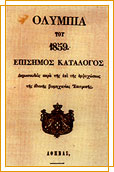First Zappian Games
A wealthy Greek from northern Greece, Evangelis Zappas, inspired by the idea of Alexandros Soutsos to revive the ancient Olympic Games,  suggested to the Greek government to finance the establishment of modern Olympics. suggested to the Greek government to finance the establishment of modern Olympics.
Alexandros Rizos Rangaves, the Greek Foreign Minister and a scholar, had objections: "the present day spirit is different from the one of antiquity; present day states compete one another in industry and products and not in the stadiums".
According to Rangaves, the modern Olympics Games had to focus on the agriculture and industrial progress and not on athletics. That is why he suggested to Zappas a composite organisation that should include agricultural/industrial exhibits and athletics contests for entertainment. Essentially, the industrial exhibit of the Zappian Games was organized regularly every four years and received greater attention and more money than the athletic contests.
Zappas accepted Rangaves' proposal and so in 1858 a royal decree was issued that established international contests under the name "Olympia".
1859
As the renovation of the Panathenaic Stadium had not yet been completed, the first Olympia took place in 1859 in the Loudovikos Square (present day Ethnikis Antistasis or Kotzia square, in the centre of Athens).  All the official guests, the royal family, the members of the government, the military and municipal authorities and many thousands of people attended. Since it was one of the first mass gatherings of people neither the people nor the police had any previous experience in maintaining order during this event. The fact that it constituted a new experience made the event an interesting case study for the first mass gatherings of people in the modern societies. All the official guests, the royal family, the members of the government, the military and municipal authorities and many thousands of people attended. Since it was one of the first mass gatherings of people neither the people nor the police had any previous experience in maintaining order during this event. The fact that it constituted a new experience made the event an interesting case study for the first mass gatherings of people in the modern societies.
Athletic contests had more the character of a game than of an athletic organisation. Since there were no athletes at that time, the organizing committee allowed for the participation of workers, porters etc, who were attracted by the monetary prizes of the games. According to the Press of that period, many funny incidents took place: a policeman who was in charge of imposing order, left his post and participated in the games. A beggar, even, who was passing as a blind man, participated in the games!
These games, finally, were a complete failure, mainly due to the lack of organization and overcrowding, causing discontent to the organizers and the spectators and the harsh criticism of the Press. This failure caused a negative atmosphere regarding gymnastics and athletics in general. However, the idea of the revival of the Olympic Games continued to concern both those responsible and the wide public.
|
